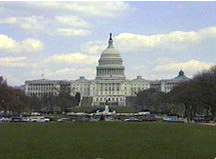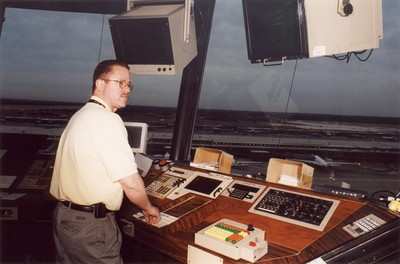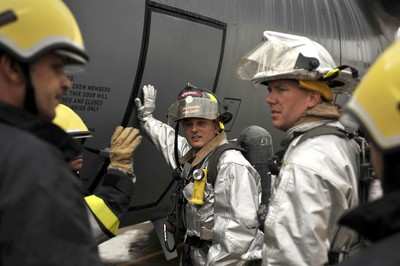James May Writes The House of Representatives... Again
ATA's James May is not giving up his misgivings about some
aspects of H.R. 915 without a fight. Just before the Resolution
passed the House, May expressed his displeasure with a number of
aspects of the Act... including the inexplicable opposition to a
rule that keep passengers from being held in an airliner
(ostensibly due to delays) for more than three hours...

As to the rest, May's Letter is set forth below....
I am writing today to reiterate the Air Transport
Association’s concerns about the current version of H.R. 915,
which have been previously voiced in our letter of March 4, 2009.
Commercial aviation represents an indispensable element of
America’s infrastructure and our nation’s economic
well-being. Commercial aviation drives over $1.1 trillion in
economic activity and 10.2 million domestic jobs. Aviation also
enables the global economy, and the improvements that we are
seeking create opportunities for the United States to be more
relevant in the aviation sector – and to effectively
participate in future global economic development. By any measure,
the U.S. airline industry is a valuable national asset and its
continued economic health should be a matter of national concern.
However, the current economic environment and an outdated air
traffic control system (ATC) represent a real threat to our ability
to create jobs and produce environmental benefits for our country.
In fact, our industry (including both cargo and passenger carriers)
lost $9.5 billion in 2008, creating a cumulative net loss from
2001-2008 of $36 billion.
 In this context, we
want to express our concern that the current legislation does not
make the needed changes to ensure acceleration of ATC
modernization, and hinders our ability to regain solid financial
footing. As it is currently crafted, we respectfully cannot support
the bill.
In this context, we
want to express our concern that the current legislation does not
make the needed changes to ensure acceleration of ATC
modernization, and hinders our ability to regain solid financial
footing. As it is currently crafted, we respectfully cannot support
the bill.
Commercial aviation faces stark challenges given the decrease in
demand resulting from current economic insecurity. The industry
suffered tremendously from last year’s skyrocketing fuel
prices and carriers had to respond by reducing capacity, which
means jobs lost and service to cities reduced or lost completely.
Airline employment has dropped over 28 percent since 2001, marking
a loss of one out of every four industry jobs. Last year alone,
mostly as a result of skyrocketing fuel prices, over 28,000 airline
employees lost jobs, and thousands more job losses are expected in
2009.
Given these perilous economic times, we have asked that key
provisions be modified. However, it appears that these provisions
were not modified and, in fact, Congressman Minnick was denied the
opportunity to replace the $2 billion Passenger Facility Charge
(PFC) tax increase with a pilot program.
We have asked that Congress:
- Expedite investment in and deployment of NextGen. The United
States is at a critical juncture right now. Either we can
accelerate the transformation of the ATC, to allow air
transportation to grow in a safe and efficient manner while
achieving environmental benefits, or we can risk bringing our
economy and leadership in technology to a halt by failing to
address our growing aviation capacity constraints. Leadership from
the committee is needed to ensure that appropriate funding and
program direction is in place to accelerate the deployment of this
critical program.

- Reject increasing taxes and fees on passengers. An increase in
the maximum passenger facility charge (PFC) from $4.50 per segment
to $7 per segment would impose an additional and unwarranted $2
billion tax increase per year on commercial passengers. With
airport revenue eclipsing record levels – over $12.7 billion
in 2007 – and with $27 billion in unrestricted financial
assets, the imposition of an increased PFC tax is not only
unwarranted, but also will further reduce demand for
travel.
- Protect our valued U.S. aviation repair facilities by ensuring
that any requirements are applied in a manner consistent with U.S.
obligations under international agreements. During recent
conversations between U.S. trade associations and European
officials, the Europeans have indicated that as a result of the
current language in Section 303, many U.S. facilities would be
subject to new, regulatory requirements by the European Aviation
Safety Agency (EASA). Such duplicative, burdensome impositions are
in no one’s interest.
- Reject the automatic elimination of previously granted
antitrust immunity (ATI) to carriers for international marketing
alliances. DOT has approved international airline alliances because
they produce numerous and substantial benefits, both to the public
and the participating carriers. Arbitrarily terminating antitrust
immunity will have a harsh impact on airline employees and cause a
ripple effect across the travel and tourism industry at a time when
the industry is already hobbled.

- Maintain safety without requiring overly strict fire-fighting
standards. Federal Aviation Administration (FAA) regulations have
safely dictated staffing and equipment requirements for airport
fire stations for years based on the needs within the airport
boundary. Increasing staffing and equipment based on surrounding
populations will not enhance airport safety but will increase costs
unnecessarily. These are not legitimate safety claims and should be
rejected.
- Allow carriers to continue improving customer service without
imposing unsafe or unreasonable deplaning requirements. In
particular, we oppose a hard-and-fast rule requiring airlines to
give passengers the option to deplane after three hours. Mandatory
deplaning will have numerous unintended consequences that,
ultimately, will create even more inconvenience for passengers and
lead to even more flight cancellations.
 Furthermore, according
to data compiled by the FAA and certified by the IRS, airlines and
their customers contributed $11 billion to the Aviation Trust Fund,
well in excess of 90 percent of total Trust Fund receipts, yet the
FAA Cost Allocation Report shows that passenger and cargo airline
operations only account for approximately two-thirds of ATC costs.
In contrast, business jets (general aviation, turbine aircraft and
fractional aircraft) contributed only 5 percent of the revenue
($573 million) but accounted for 17 percent of the costs. While HR
915 takes a step in the right direction toward mitigating the
subsidy that passengers are paying for corporate jets, it does not
achieve a balance in which each user group is paying for the costs
that they impose on the system.
Furthermore, according
to data compiled by the FAA and certified by the IRS, airlines and
their customers contributed $11 billion to the Aviation Trust Fund,
well in excess of 90 percent of total Trust Fund receipts, yet the
FAA Cost Allocation Report shows that passenger and cargo airline
operations only account for approximately two-thirds of ATC costs.
In contrast, business jets (general aviation, turbine aircraft and
fractional aircraft) contributed only 5 percent of the revenue
($573 million) but accounted for 17 percent of the costs. While HR
915 takes a step in the right direction toward mitigating the
subsidy that passengers are paying for corporate jets, it does not
achieve a balance in which each user group is paying for the costs
that they impose on the system.
Finally, a number of amendments will be considered today, which
raise additional concerns. Specifically, an amendment to stop the
implementation of the Northeast airspace redesign will certainly
contribute to further air traffic delays in the Northeast. Airspace
redesign is an essential element of modernization and a more
efficient and environmentally responsible air traffic control
system. Airspace redesign was started by the FAA over a decade ago
– it was badly needed then and is desperately needed now.
Another amendment would impose operating limits on flights at one
airport – which essentially waives the Airport Noise and
Capacity Act (ANCA) requirements for this airport, as well as
impeding travel and commerce.
The Air Transport Association stands ready to work with Congress
in ensuring that a final FAA reauthorization bill addresses these
concerns and provides for investment in ATC modernization. The
environmental, capacity and efficiency benefits of NextGen are
critical to meeting the needs of the flying and shipping
public.
 ANN's Daily Aero-Linx (04.15.24)
ANN's Daily Aero-Linx (04.15.24) Classic Aero-TV: 'No Other Options' -- The Israeli Air Force's Danny Shapira
Classic Aero-TV: 'No Other Options' -- The Israeli Air Force's Danny Shapira Aero-News: Quote of the Day (04.15.24)
Aero-News: Quote of the Day (04.15.24) Airborne 04.16.24: RV Update, Affordable Flying Expo, Diamond Lil
Airborne 04.16.24: RV Update, Affordable Flying Expo, Diamond Lil ANN's Daily Aero-Term (04.16.24): Chart Supplement US
ANN's Daily Aero-Term (04.16.24): Chart Supplement US







